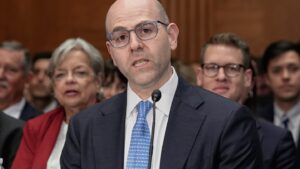Congress
Capitol agenda: Dems dig in against the GOP CR
Democrats say they won’t accept the stopgap funding bill Republicans unveiled Tuesday, further increasing the chances of a government shutdown Oct. 1.
“The House Republican-only spending bill fails to meet the needs of the American people and does nothing to stop the looming healthcare crisis,” House Minority Leader Hakeem Jeffries and Senate Minority Leader Chuck Schumer said in a joint statement, pledging to propose their own continuing resolution, or CR, that ties in an extension of enhanced Affordable Care Act insurance subsidies.
But in order to keep their leverage to force Republicans back to the negotiating table, Democratic leaders need to minimize defections — and purple-district lawmakers could take political heat if they vote against a government funding patch.
Frontline Democrats are set to huddle Wednesday morning with Jeffries to discuss their options, according to two people granted anonymity to share details about a private meeting. Reps. Laura Gillen and Don Davis are expected to press Democratic leaders during the meeting to push for any CR to include funding for local law enforcement efforts, as outlined in a letter shared first with Inside Congress.
So far, many at-risk Democrats are noncommittal. “I don’t know how I’m voting on it right now,” Rep. Susie Lee (D-Nev.), who holds a leadership position representing battleground lawmakers.
Rep. Jared Golden of Maine, the only House Democrat who voted for the GOP’s last CR in March, didn’t answer when asked if he would support Republicans’ latest plan.
Even if House Democrats stick together and vote in opposition, House Republicans can only lose two of their own members with full attendance — and GOP Rep. Warren Davidson (Ohio) signaled his hesitance Tuesday. But Speaker Mike Johnson is working to lock in his rank-and-file before a vote as soon as Thursday, and many appear to be getting in line. One Freedom Caucus member granted anonymity to speak candidly, when asked about the CR prospects, made a remark to Blue Light News that would normally be surprising: “I think we’re all fine.”
Across the Capitol, everyone is watching the ten Senate Democrats who this spring defied their base’s demands to reject the GOP funding bill and instead helped Republicans overcome a procedural hurdle to avert a shutdown. Progressives are warning Democratic lawmakers even more loudly this time not to cave.
Hawaii Sen. Brian Schatz — expected to be the No. 2 Senate Democrat in the next Congress — was one of the ten lawmakers to vote against a shutdown. But now he’s showing a change in tune.
“Trump said yesterday that he doesn’t need to work with Democrats. If that’s the case I wish him the best,” Schatz said in a post on X. “I’m a no.”
What else we’re watching:
— Monarez takes the stand: Susan Monarez, the former CDC director who was fired by HHS Secretary Robert F. Kennedy Jr., will testify Wednesday before the Senate Health, Education, Labor and Pensions panel after an invitation from Chair Bill Cassidy (R-La.). She is expected to say she was shown the door for refusing to comply with the administration’s demands and pre-approve vaccine recommendations without scientific evidence.
— Patel is back: House Judiciary will hear testimony from FBI Director Kash Patel Wednesday morning. It comes after his testimony Tuesday in front of Senate Judiciary devolved into a shouting match at one point.
Nicholas Wu, Meredith Lee Hill and Sophie Gardner contributed to this report.
Congress
House committee posts new Epstein documents
The GOP-led House Oversight and Government Reform Committee released a new set of materials Tuesday as part of its investigation into the late convicted sex offender Jeffrey Epstein, including a transcript from an interview with former Trump attorney general William Barr.
It’s the latest tranche of documents to be posted publicly by the panel in recent weeks, as members of Congress continue to pummel the Justice Department for not putting out information faster.
Barr, during his closed-door testimony with committee members in August, said, among other things, he understood potential reasons why some of the Epstein documents and materials have not yet been made public.
“[T]he general principle is, if you have enough evidence to charge someone, you put that evidence out through the process, but you don’t just open your files,” Barr told lawmakers, according to the transcript. “So I understand why there is reluctance to do it. And, as I say, the Attorney General has to make a balance.”
The committee also publicly released letters from former attorneys general Alberto Gonzales, who served in the President George W. Bush administration, and Jeff Sessions, who served in the Trump administration before Barr. Both men were handed subpoenas for depositions as part of the panel’s investigation, but both wrote they had no memory of information related to the Epstein case that was relevant to share.
Oversight Committee chair James Comer on Tuesday disclosed his requestthat the Epstein estate turn over unredacted copies of the materials it sent over to lawmakers, including cash ledgers, message logs, calendars and flight logs. Congressional staff have already viewed these unredacted materials but only in a meeting with Epstein’s attorneys in New York City; they do not currently have the files in their position.
A second set of materials from the Epstein estate was also released publicly, including two new pagesfrom the so-called birthday book that was put together as a gift for Epstein’s 50th birthday. One is a page labeled “Contents” that lists some contributors to the book, including former President Bill Clinton and attorney Alan Dershowitz; the other is a letter from Coco Brown or “Degenerate II.”
“(so many girls, so little time)? And you there Jeffrey, always grinning like the mysterious mischievous lad you are,” wrote Brown, who is listed as one of Epstein’s friends. “I remember it all with a smile. Though with a melancholy smile to think that you are at mid-century a mere boy, (Though we vampires are supposed to age slowly) ((if at all)).”
The materials’ release comes as FBI Director Kash Patel defends the administration’s handling of the Epstein case in two hearings on Blue Light News this week. He faced tough questioning from lawmakers of both parties during a Senate hearing on Tuesday, and Patel is scheduled to go before House lawmakers on Wednesday.
Congress
Senate Democrats to propose alternative to GOP stopgap
Senate Democrats are preparing to offer an alternative stopgap spending bill that would avert an Oct. 1 government shutdown as they dig in against the Republican majority.
Sen. Tim Kaine (D-Va.) told reporters as he left a caucus lunch Tuesday that Democrats will offer a short-term spending bill that includes health care language as well as restrictions on President Donald Trump’s ability to rescind funding previously approved by Congress.
“We think we’re going to have … an alternative that American people will like a whole lot better,” Kaine said.
Another person granted anonymity to disclose private discussions confirmed the Democrats’ plan, adding that the proposal could be released as soon as Tuesday evening.
The idea of formally offering an alternative bill came up during the closed-door lunch and comes after top Democratic leaders have pushed for bipartisan negotiations without outlining what specific policy proposals they are seeking in return for their support for a weeks-long spending bill.
House Republicans rolled out a continuing resolution Tuesday that funds the government through Nov. 21, tacking on $30 million for lawmaker security and another $58 million in security assistance requested by the White House for the Supreme Court and executive branch.
But Senate Minority Leader Chuck Schumer and House Minority Leader Hakeem Jeffries immediately panned the bill in a joint statement and vowed to oppose it, citing its lack of health care provisions.
Sen. Brian Schatz (D-Hawaii), who is line to be the No. 2 Senate Democrat starting in 2027, also said Tuesday he would be a “no” after helping advance a previous GOP-written stopgap in March.
He noted to reporters that Trump has said Republicans don’t have to “deal with the Democrats” on spending.
“Godspeed,” Schatz said.
Republicans will need at least seven Democrats to help advance their funding bill — and likely more, with Sen. Rand Paul (R-Ky.) saying Tuesday that he will not support it. Only one Democrat so far, Sen. John Fetterman of Pennsylvania, has publicly indicated he will vote for it.
Democrats appear increasingly confident Trump will be blamed for any potential shutdown after he said during a Friday Fox News interview that he doesn’t need Democratic votes. They also believe the political climate has moved in their favor since the March funding fight, based on their ability to recruit top Senate candidates and brewing divisions among Republicans over Trump’s efforts to circumvent Congress on spending cuts.
“It’s much different now,” Schumer told reporters. “The Republicans are in a much weaker position now than they were then.”
Senate Majority Leader John Thune opened the door Tuesday to meeting with Schumer but said that the New York Democrat hadn’t called him or come to his office.
Schumer brushed off those comments, noting that he and House Minority Leader Hakeem Jeffries have sent two letters to Thune and Speaker Mike Johnson requesting a meeting.
“Give me a break,” Schumer said. “We have asked to meet with Thune and Johnson for over six weeks.”
Congress
House again votes to surrender tariff powers to Trump
House Republicans voted in near lockstep Tuesday to again cede congressional power over tariffs to President Donald Trump.
A measure that effectively blocks challenges to Trump’s sweeping global tariff declarations through March 2026 was adopted on a 213-211 vote. The vote was gaveled down only after GOP whips had a drawn-out struggle on the floor with a band of Republicans who initially opposed the legislation before flipping to yes. The vote was held open for more than a half-hour as they worked to bring the members back on board.
Three Republicans — Reps. Kevin Kiley of California, Thomas Massie of Kentucky and Victoria Spartz of Indiana — ended up joining Democrats to oppose the measure, a “rule” which also teed up several D.C.-related criminal justice bills for debate.
“I think this is a misuse of what rules are for, and I think it’s bad for the representative process,” Kiley said of the tariff provisions.
-
Uncategorized10 months ago
Bob Good to step down as Freedom Caucus chair this week
-

 The Josh Fourrier Show10 months ago
The Josh Fourrier Show10 months agoDOOMSDAY: Trump won, now what?
-

 Politics7 months ago
Politics7 months agoFormer ‘Squad’ members launching ‘Bowman and Bush’ YouTube show
-

 Politics10 months ago
Politics10 months agoWhat 7 political experts will be watching at Tuesday’s debate
-

 The Dictatorship7 months ago
The Dictatorship7 months agoPete Hegseth’s tenure at the Pentagon goes from bad to worse
-

 Politics10 months ago
Politics10 months agoHow Republicans could foil Harris’ Supreme Court plans if she’s elected
-

 The Dictatorship7 months ago
The Dictatorship7 months agoLuigi Mangione acknowledges public support in first official statement since arrest
-
Economy10 months ago
Fed moves to protect weakening job market with bold rate cut




